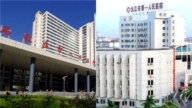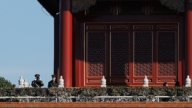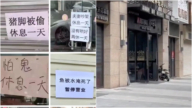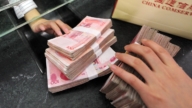【新唐人2012年12月26日讯】近来中共新政准备推出的官员财产申报制度,被官媒誉为“阳光法案”,似乎给期待中共改良的老百姓带来了又一线希望。不过专家指出,中共的腐败是整个政治的腐败,经济腐败只是一个表象,所谓的阳光法案,却是企图用打击经济腐败来减轻社会压力,维持中共腐败的政治体制。
大陆官方媒体最近报导,“中纪委”已着手起草《公职人员财产申报法》的建议稿。官员财产申报制度被视为反腐重大举措。
目前中共进行官员申报财产主要集中在基层,采取官员内部申报办法。今年7月以来,广东试点横琴新区处级以上干部的家庭财产在内部公示,但厅级干部无需申报。而韶关市始兴县,申报主体为科级干部。
时政评论家蓝述认为,中共作为一个特权党,级别越高越能凌驾于法律之上,当局提出官员财产申报的制度,主要目地是为了减轻社会压力,蓝述说,如果真的想公布官员财产,应该从最高层开始。
时政评论家蓝述:“大的官员不敢碰,抓小的官员也有一个保护手段,中纪委首先介入调查,背后会牵出谁,把所有的东西都摸清楚了之后,最后关起门来,各个派系之间进行妥协,决定牺牲谁、不牺牲谁,全部都决定好了之后它才进入法院程序,才公开,公开的目地是为了给社会一个交代,共产党搞廉洁了。”
另外,由“中纪委”出手起草官员财产申报法案,也招来很多猜疑。不少人担心,“党内纪律部门”参与“国家法律制定”,是越俎代庖。
蓝述:“直接放到法院,所有的媒体马上聚焦,在法院公开的程序过程之中,被审判的贪官他可能交待出他后面是谁,被交代出来的贪官又会交待是谁,整个过程中共不可能预先知道,一下子就搞出一个政治地震,这是他为什么要中纪委先去处理的一个最主要的原因,它要把对中共统治的伤害降到最低程度。”
大陆律师唐吉田指认为,官员财产申报法案在中共法律制定的程序上没有太大问题,但中纪委的公信力倍受质疑。唐吉田还说,应该是要求官员公开财产而不是申报财产。
大陆律师唐吉田:“可能它(中纪委)的代表性不够,而且不应该是申报,应该是公开,以我们这几十年的政治文化所形成的这种习惯,好多人他没有压力,没有监督、没有制约的情况下,我不相信他们会自觉的、如实的,把自己的财产向相关单位去登记。”
12月9号,广东省试行官员财产公示试点名单诞生,试图在珠海市横琴新区、广州市南沙新区、韶关市始兴县开始实行。
唐吉田指出,官员应该无条件的向民众公开自己的财产,如果采取试点制,百姓的财产全部被贪官们搜刮完毕再来实施,没有意义。唐吉田说,国外官员公开自己财产的精华部分,被中共给阉割了。
唐吉田:“正常国家一些行之有效的方法,在我们这块土地上一些人经常会把它改头换面,比较合理的比较正常的成分反倒被过滤掉了,一些让他们规避社会制约、监督,规避他们推卸责任的某些内容,会被他们发扬光大。”
北京《国情内参》刊物首席研究员巩胜利指出,中共从江泽民时代就开始所谓反腐,不过越反越腐。
北京《国情内参》首席研究员巩胜利:“中共反腐败没完没了,一代比一代腐败的多,最麻烦的是,如果这个申报制度出笼的话,大多数的中共官员都要倒下去,如果大部分官员都倒下去,那共产党再怎么样生存﹖”
“反腐亡党,不反腐亡国”,已经成为中国人的共识。不过中共的历次反腐斗争中,奉行着以经济手段解决政治性问题。蓝述指出,因为司法的不独立,反腐往往成为中共内部互相打击对方的一种工具。
采访编辑/刘惠 后制/君卓
Property Declaration Policy Launched For China Officials
Recently, the Chinese Communist Party (CCP) launched a
policy requiring officials to declare their property.
The state media called it “Sunshine Law”.
It seems to bring some hopes to civilians.
However, experts pointed out that the CCP’s corruption
has an impact on its whole system.
The economic corruption only shows up the problems
on the surface.
The purpose of the “Sunshine Law” is to suppress economic
corruption leading to a reduction of the social pressure.
It is to make the CCP corrupted systems survive.
The state media in mainland China reported the Central
Commission for Discipline Inspection (CCDI) has drafted
a proposal of officials’ property declaration.
This is considered a major move towards anti-corruption.
The officials’ property declaration policy starts with
grassroots level officials internally.
Since July 2012, it has been tested in Guangdong.
The cadres above county level internally need to
declare their property.
However, ministerial level cadres don’t need to
declare anything.
The department level cadres at Shixing County
in Shaoguan are the officials to make the declaration.
Lan Shu, the Current Affairs Commentator believes the CCP
is a privileged party.
The higher level it is, the better off they can be above the law.
The purpose of the declaration policy is to reduce the
social pressure by apparently revealing officials’ interests.
Lan Shu said that if they really wanted to declare officials’
property, it should start from the top level.
Lan Shu: “They dare not to touch the high level; if they catch
an unimportant official, they would use a means of protection.
The CCDI investigates first, checking who has been involved,
after they make it clear, they discuss with related factions.
Then they decide who will be pulled out.
After the decision has been made, then it will enter the
law process. Finally publicizing it.
It is only to give the public the impression that the CCP
is cleaning up the corruption.”
It brought many questions that the draft law of declaration for
officials’ property was proposed by the CCDI.
People are worried that CCDI has involved itself in law making,
way beyond its role.
Lan Shu: “If corrupt officials were handed to the Court,
the Media will immediately focus in on them.
During the court procedure, the corrupt officials may
reveal who is the man behind them.
The man behind them will confess further; it is unpredictable.
It could bring about a political earthquake.
That’s the major reason why the CCDI involved at the
beginning, as it reduces the risk of damaging the CCP.”
Lawyer in mainland China, Tang Jitian believes
it shouldn’t be a problem on procedure to create an official’s property declaration policy.
However, the CCDI’s public credibility
is in doubt.
Tang said, they should request officials publicize property
rather than declaring their property.
Tang Jitian: “The CCDI hasn’t had enough credibility.
It shouldn’t declare but rather publicize.
Following several years of habits formed on political culture,
without applying pressure, supervision and restriction, officials
won’t automatically and truthfully declare their property.”
On Dec.9th a list of testing places to implement the officials’
declaring their property was formed.
It included Hengqin New District in Zhuhai, Nansha New
District in Guangzhou and Shixing county in Shaoguan.
Tian Jitian points out that officials should publicize their
property unconditionally.
If they only take several places to test, civilians’ property
will be all plundered by corrupt officials.
Then there is no meaning to do it after all.
Tang said that officials in foreign country publicize their
property and its essential meaning will be omitted by the CCP.
Tang Jitian: “Effective method used in other country
were changed completely here.
The essence parts are often filtered out.
Some parts on how to avoid restriction, supervision and
shift responsibilities were taken by the CCP.
Gong Shengli, chief researcher of
Guoqing Neican magazine said that
the CCP began to anti-corruption since Jiang Zemin era,
yet, more it has done, more it has been worsened.
Gong Shengli: “The CCP’s anti-corruption campaign
is endless. Yet one generation is worse than another.
The most trouble is, if the declaration policy is set, most CCP
officials will be removed. So how can the CCP survive?”
Chinese people understand, “Anti-corruption, the CCP will
collapse; if no anti-corruption, the country will collapse.”
In the CCP’s past history of anti-corruption, it followed the
method of using economic means to solve political problems.
Lan Shu said, because the judiciary isn’t independent,
anti-corruption became tools to fight against each other.




























